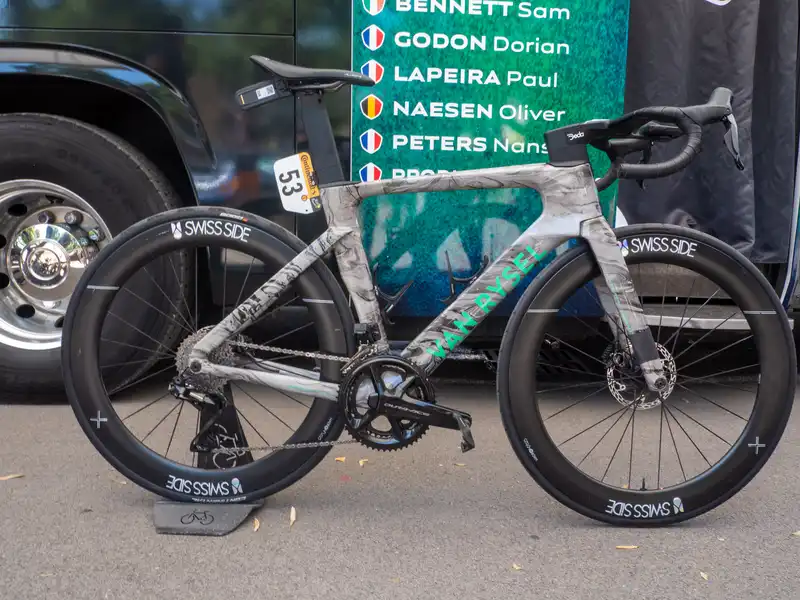A rider from Decathlon AG2R La Mondiale was spotted riding a new aerobike from French brand Van Rysel.
Last November, AG2R La Mondiale announced the addition of French sports retailer Decathlon as co-title sponsor. This announcement coincided with news that Van Reisel, Decathlon's premium cycling brand, would provide the team with an RCR Pro road bike.
When the RCR Pro debuted, it was presented as an all-around, do-everything race bike that combined aerodynamic optimization with light weight. The bike attracted a lot of attention upon its launch, and replicas sold out within the first few hours of being made available to the public.
With this new aero bike, Van Riesel seems to be bucking the trend of other manufacturers and diversifying its product range rather than slimming it down.
Trek just last week announced the new Gen 8 Madone, which combines elements of both Madone and Emonda, ultimately killing off the Madone.
Although it is only speculation at this point, it appears that the new bike will be called the FCR, and the decals on the top tube suggest this. This is clearly a completely aero optimized machine. A quick look around the bike's silhouette reveals all the characteristics of a dedicated aero bike. The deep junctions of the head tube, top tube, and downtube seem to take full advantage of the UCI's relaxed aero profile.
At the beginning of 2023, the UCI revised its regulations regarding the aero profile allowed in bike design. As a result, bikes became more aero, especially behind the head tube where the top and down tubes intersect. Van Reissel is not the first brand to steer toward this design theory; Pinarello's new DOGMA F model and the unreleased Canyon AEROAD also use this design.
The lower front fork of the bike is considerably deeper than RCR's fork. The move to aerodynamically optimize the front of the bike is wise, and given that it is the front edge, it is where most manufacturers are currently focusing their efforts.
Like the RCR Pro, Deda uses an integrated cockpit, and the aero headset spacer allows the integrated unit to seamlessly integrate with the frameset.
The FCR name is not new to Van Riesel; the brand already uses the name on its premium aero road helmets.
Mounted on the inside of the wide stance fork, which could fit very wide rubber, is the latest tire from DT Swiss, Continental, and Swiss Side, the Aero 111. This front-specific tire has a specially developed vortexing tread pattern that creates a vortexing effect across the wheel's The company says it enhances the sailing effect across the entire rim.
The rear of the bike also emphasizes the bike's aero intent with a deep-section aero profile on the seatstays; like the RCR Pro, the seatstays have a wide stance with a short horizontal section joining the seat tube.
This makes the blade stays closer parallel to the direction of airflow, again increasing the bike's airflow efficiency.
This type of design has been used on track bikes in recent years to achieve better total system aerodynamics when the rotating rear wheel and rider are factored into the equation.
Beyond what can be seen from the photos, specific data on the new bike's advantages over the RCR Pro will have to wait until Van Rysel releases more details on the new bike.


Comments